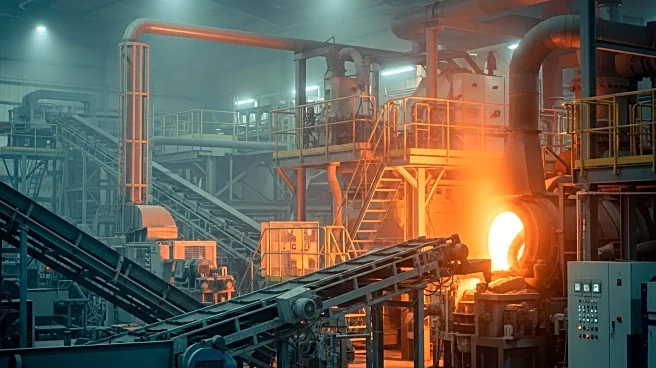What's Happening?
Aurubis AG, Europe's largest copper producer, has initiated production at its newly established metal recycling facility in Richmond, Georgia. The plant, which represents an $800 million investment, is designed to process up to 180,000 metric tons of complex waste recycling material annually, including printed circuit boards and copper cables. The facility aims to produce 70,000 tons of high-grade blister copper with a purity of 98-99%, alongside nickel, tin, and precious metals. Aurubis plans to primarily sell the copper to US customers, addressing the growing demand for strategic metals in the country. The US currently imports about half of its 1.8 million tons annual copper demand, and the Richmond plant is expected to significantly reduce these imports.
Why It's Important?
The opening of Aurubis' recycling plant in Georgia is a strategic move to bolster domestic copper production and reduce reliance on imports. This development is crucial for the US economy, as copper is a vital component in various industries, including electronics and construction. By increasing local production, the plant supports the US's strategic goal of enhancing self-sufficiency in critical materials. Additionally, the facility's focus on recycling aligns with broader environmental sustainability goals, potentially reducing the environmental impact associated with mining and metal production. The plant's operation could also stimulate local economic growth through job creation and increased industrial activity.
What's Next?
Aurubis plans to reach full production capacity by the first half of 2026. The company is considering further expansion projects in the US, driven by the high availability of recycling material and favorable local conditions. This could lead to increased investment in the US recycling sector, further reducing metal imports and enhancing domestic production capabilities. Stakeholders, including local governments and environmental groups, may closely monitor the plant's impact on local economies and sustainability efforts.
Beyond the Headlines
The establishment of the Richmond plant highlights the growing importance of recycling in the metal industry, reflecting a shift towards more sustainable practices. This move could encourage other companies to invest in similar facilities, promoting a circular economy model. The plant's success may also influence policy decisions regarding import tariffs and incentives for domestic production, potentially reshaping the US metal industry landscape.











